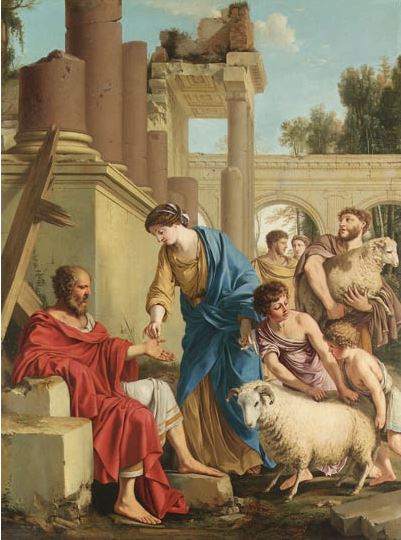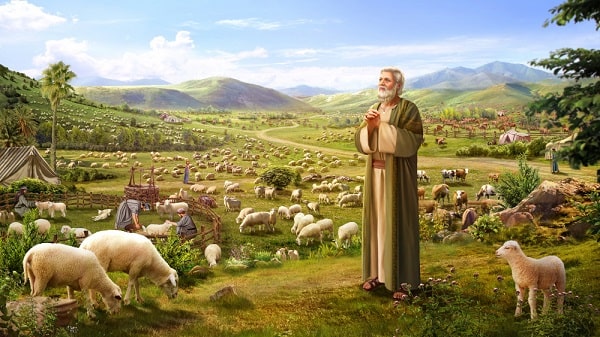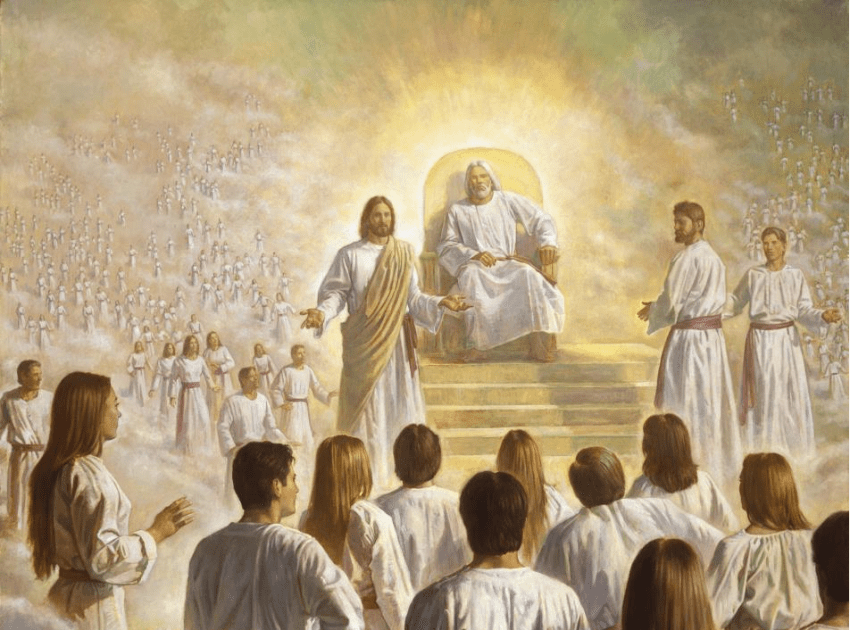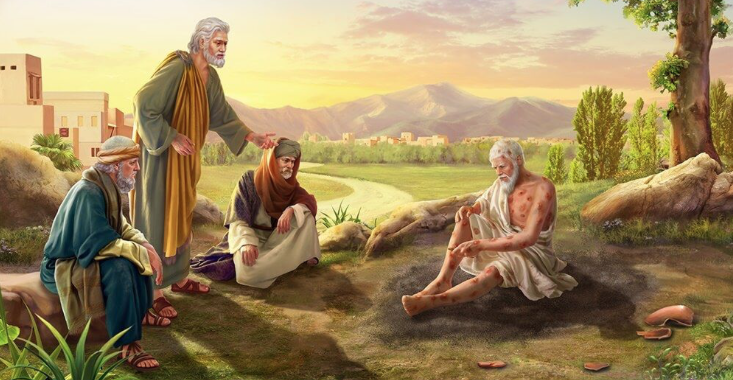To accompany your Come Follow Me study for August 1-7
In addition to reading these prescribed chapters, you may enjoy:
- The corresponding material from the Institute student manual found in the online Gospel Library
- The video Come Follow Me 2022 LDS (August 1-6) Job | Refiner’s Fire at https://www.youtube.com/watch?v=iL6HZlpcMJA
- The animated video, The Animated Bible Series | Season 1 | Episode 3 | Job | Michael Arias at https://www.youtube.com/watch?v=zv5UvtkZi10
- The video, The Book of Job (Bible Project,7 minutes) at https://www.youtube.com/watch?v=GswSg2ohqmA
- The video The Book of Job (Part 1, 31 minutes) at https://www.youtube.com/watch?v=95EYjHfqMxw
- The video The Book of Job (Part 2, 31 minutes) at https://www.youtube.com/watch?v=kLVbo4Vqfq4
The video The Book of Job (Part 3, 30 minutes) at https://www.youtube.com/watch?v=_WjwfExs_iM
The video The Book of Job (Part 4, 42 minutes) at https://www.youtube.com/watch?v=HRJo_Wj6Llg
If you would enjoy seeing a Kahoot game related to this material which you could use for your own amusement or with your family or class, click here: https://create.kahoot.it/share/job-1-3-12-14-19-21-24-38-40-42/f4b0ed1b-4607-4eaa-af28-fd05c692a486. (To use it with a group, after clicking on this link, you will need to log into Kahoot, creating a free account if you have not done so previously, then click on the blue “Start” button.)
Points to Ponder in Job
1. What is there about the book of Job that would have led Victor Hugo to say, “The book of Job is perhaps the greatest masterpiece of the human mind” and Thomas Carlyle to say, “There is nothing written, I think, in the Bible or out of it, of equal literary merit”?
2. Why do many Bible readers believe that Job was not actually an historical figure and that the Book of Job is just inspired fiction?
3. Why do many others believe Job really existed?
4. Which position do you personally take, and why?
Alma commanded his people “that they should preach nothing save it were repentance and faith on the Lord.” (Mosiah 18:20) The Lord gave similar instructions to early missionaries in our day. (D&C 19:31.) It is often useful to use the same standard when studying the scriptures, asking what in a given chapter tends to increase our faith and/or what may move us to repentance. Both faith and repentance can be further subdivided, as we will see below.
5. What in this week’s reading could tend to increase our faith in the reality, power, and goodness of God?
6. What in this week’s reading could tend to increase our conviction of the divinity of The Church of Jesus Christ of Latter-day Saints?
7. What in this week’s reading tends to motivate you to live better?
8. What in this week’s reading provides helpful instruction on how to live better?
9. In Job 16:2, Job says of his friends, “Miserable comforters are ye all.” What mistakes did his friends make that we would want to avoid if we were talking with someone who had suffered such misfortune as Job had?
10. Which of the following do you consider to be major teachings to be gleaned from the Book of Job?
- God sends trials and suffering to us to test us.
- If we are faithful to God, He will reward us handsomely both temporally and spiritually before we die.
- We will not always know why bad things happen to good people.
- A personal testimony of God’s existence and goodness and of our own standing before Him is essential to make it successfully through the trials of mortality.
- God is more powerful, wiser, and more loving than any of us could be at present.
- God is more powerful than Satan.
- We can and should trust the Lord even when we don’t understand what He is doing.
- Blessings come from successfully enduring trials.
- God does not necessarily immediately reward righteousness nor punish evil.
11. Why do you suppose God in the end gave Job double the number of camels, sheep, etc., but only the same number of children as he had once had?

Possible Answers to Points to Ponder in Job
1. What is there about the book of Job that would have led Victor Hugo to say, “The book of Job is perhaps the greatest masterpiece of the human mind” and Thomas Carlyle to say, “There is nothing written, I think, in the Bible or out of it, of equal literary merit”?
Two reasons:
- It is written in beautiful Hebrew poetry, the elegance of which is often lost on 21st century English readers.
- It deals poignantly with one of the deepest of all theological questions: Why do bad things happen to good people?
2. Why do many Bible readers believe that Job was not actually an historical figure and that the Book of Job is just inspired fiction?
They argue:
- Satan does not, in fact, have free reign to roam around heaven, as Job 1 and 2 seem to portray.
- God wouldn’t stoop to “making a bet” with Satan, as though both were wagering on the outcome of the Super Bowl.
- The story is just too neat to be believable:
- Calamities come to Job in incredibly rapid succession.
- It seems that if he had really been “the greatest man in the East,” there would be some evidence of him outside of the Old Testament.
- His family is just too perfect to be believable, as is its double restitution at the end of the book. And Job himself is said to be “perfect” (1:1), which description we usually reserve for Jesus Himself.
- It seems unlikely that anyone in Job’s position or the position of his would-be comforters would go seven days without speaking. (Job 2:13.)
- A story doesn’t have to be historical to be inspired. For example, the prophet Nathan told David an invented story about a poor man with one little ewe lamb to illustrate a point. Many of Jesus’ parables, likewise, seem to have the same purpose. It is not necessary to believe there was really a Good Samaritan in to appreciate the lesson of the parable by that name, nor that a specific merchant man really found an immensely valuable pearl and sold all he had to buy it.

3. Why do many others believe Job really existed?
They point out that:
- Ezekiel 14:14, James 5:11, and D&C 121:10 all mention him.
- The story is presented to us in the Old Testament as having really happened.
- The “neatness” of the story to which some critics object should pose no problem to an omnipotent God.
- Noah is also called “perfect” in the Old Testament (Gen. 6:9) and the Doctrine and Covenants asserts that the same was true of Seth (D&C 107:43). The word which is so translated can mean simply “complete, whole, or having integrity,” as the footnote to Genesis 6:9 explains, without requiring absolute infallibility.
- If we start questioning the historicity of parts of the Bible, it could lead to a loss of faith in its principles and teachings.
4. Which position do you personally take, and why?
Your choice. I personally doubt the literal accuracy of the story of Satan and God betting on Job’s integrity in chapters 1 and 2. I am quite open to the idea that there could well have been an historical Job who proved true to God despite terrible misfortunes. But my faith won’t be shaken if I someday am shown that the story was simply inspired fiction to teach important principles.
Alma commanded his people “that they should preach nothing save it were repentance and faith on the Lord.” (Mosiah 18:20) The Lord gave similar instructions to early missionaries in our day. (D&C 19:31.) It is often useful to use the same standard when studying the scriptures, asking what in a given chapter tends to increase our faith and/or what may move us to repentance. Both faith and repentance can be further subdivided, as we will see below.
5. What in this week’s reading could tend to increase our faith in the reality, power, and goodness of God?
The ending of the Book of Job, which:
- Emphasizes God’s superiority in power, wisdom, and goodness to that of man.

- Shows that God blessed Job in the end with double the temporal blessings which he had once had.

6. What in this week’s reading could tend to increase our conviction of the divinity of The Church of Jesus Christ of Latter-day Saints?
- Job 38:4-7, which speaks clearly of a pre-mortal life, when “all the morning stars sang together, and all the sons of God shouted for joy” at the announcement of God’s plan for our mortality.

- Job 19:25-26, which testifies that
- We can know for ourselves of God’s existence
- There will be a literal, physical resurrection, where we will see God “in the flesh,” and not merely some sort of “spiritual resurrection.”

- Job literally saw God (42:5), just as other prophets before and since have done.

7. What in this week’s reading tends to motivate you to live better?
Job’s strength and integrity are displayed in virtually every chapter. If he could do it, in the face of such challenges, we can do it!
8. What in this week’s reading provides helpful instruction on how to live better?
- Don’t let another (like Job’s friends) lead you with their “inspiration.”
- Don’t judge another by his current circumstances, as Job’s friends did.
- We each need to strive to have a personal conviction of our own worthiness in God’s sight, as Job did. (Job. 13:18)

9. In Job 16:2, Job says of his friends, “Miserable comforters are ye all.” What mistakes did his friends make that we would want to avoid if we were talking with someone who had suffered such misfortune as Job had?
At a minimum we would want to
- Do a lot more listening and less talking.
- Be a lot more loving and less judgmental.
- Not assume that we had all the answers.
- Not assume that temporal trouble was a result of sin.
10. Which of the following do you consider to be major teachings to be gleaned from the Book of Job?
I personally believe those highlighted in red to be true.
- God sends trials and suffering to us to test us. [God does not send the trials and suffering, but He does allow us to pass through them sufficiently to refine us and prepare us for exaltation.]
- If we are faithful to God, He will reward us handsomely both temporally and spiritually before we die. [Job is probably an exception to the rule. Many of God’s blessings for righteousness are spiritual, rather than temporal, and some will not come until the life to come.]
- We will not always know in this life why bad things happen to good people.
- A personal testimony of God’s existence and goodness and of our own standing before Him is essential to make it successfully through the trials of mortality.
- God is more powerful, wiser, and more loving than any of us could be at present.
- God is more powerful than Satan.
- We can and should trust the Lord even when we don’t understand what He is doing.
- Blessings come from successfully enduring trials.
- God does not necessarily immediately reward righteousness nor punish evil.
11. Why do you suppose God in the end gave Job double the number of camels, sheep, etc., but only the same number of children as he had once had?
While we can’t know for sure, one possible reason is that given the eternal nature of the family, Job did end up with double the number of children, as those who had died would still be his in eternity.
